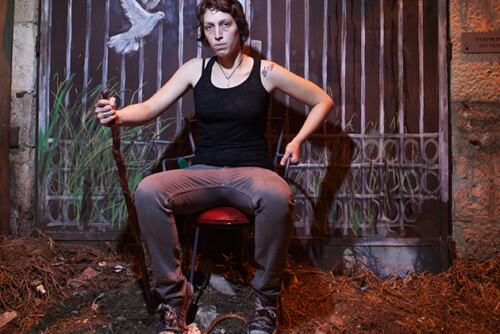Introduction
One of the first, and arguably most significant, moments when queerness and religion intersected in my life, was during a conversation I had with my mother’s oldest sister in the summer of 2001. Aunt Mary was our family’s matriarch and religious authority, and she is credited with ushering many of my family members into the fold of Black Southern Pentecostalism. I had just graduated from college and I was visiting my hometown before moving to Atlanta with my girlfriend. Because I had only dated men until I was a senior in college (and had recently discontinued my engagement to a man of whom my family was quite fond), my family was trying to come to grips with my new orientation to life, love, and relationships. Aunt Mary called to say she wanted to have a chat with me before I left town. As we sat in her living room–a space usually designated for bible studies, formal visits, and serious conversations–I waited for her to wax eloquent on the biblical and theological reasons that I should reconsider my current path toward certain life and soul destruction. Instead, she inquired a bit about the nature of my relationship, hit a few points about the danger of my soul and finally sighed. “This just isn’t the life I had planned for you,” she said with a kind of resignation that bespoke exasperation and hopelessness. I nodded and simply said, “I know.”
Before it was about my new “queer” sexuality, or my ability to relate to our family’s (queer-from-my-perspective) religion, her concern for my life was about the loss of narrative coherence for our lives. That is, I was presenting a life and new set of possibilities that were situated outside of what she had imagined for me, outside of the story of our family’s collective self-understanding. The new life that was before us—my life—did not coincide with the norms of sexuality, gender, and religious practice that were a part of our family’s presumed set of values. By taking a detour from the family’s vision for my life—a move that I found liberating and full of possibility—I had shifted my orientation, literally and figuratively, to a queer version of what was possible in divine and mundane spaces. Even more, I shifted my orientation to the cosmos and found new connections between religiosity and sexuality. For her, this was a source of pain and fear. After all, who might I become without the stability of long-established identity markers, without social scripts to guide my relationship with God? For me, it was something different. I began to wonder, in that moment and ever since, who we might all become with the instability of newly discovered subjectivity. I began to wonder about freedom.
As a social ethicist, I have been interested in the kinds of technologies of normalization (social, political, economic, and religious tools of norm creation and maintenance) that contribute to material realities of oppression for sexually and racially minoritized and marginalized people. My personal and professional question is a simple one: for what purpose and through what means are some among us subjugated? Two concerns anchor this inquiry. First, I want to know how and why we subjugate people. Second, I am asking how and why some people become ontologically subjugated. I want to know and understand the tools and strategies at work in the creation of oppressed subjectivities. For the last several years, I have pursued an answer to these questions through a combined study of religion—particularly Christian ethics—and queerness, as it has been articulated through queer theories. And because religion is a queer thing, more questions arise than answers.
What if the intersection of religion and queer studies resides in each one’s capacity to foster human pursuits of freedom? What if they both give us new ways to think about how our liberation is tied up with the destruction and dismantling of oppressive orderings of the world as well as ways that we allow ourselves to fit into others’ narratives of our lives? In fact, I wonder if they both illustrate—through intersubjective knowledge production—ways of imagining and then generating freedom.
In this essay, I suggest that religion and queer studies can be understood as methodologies of freedom that confront and dismantle technologies of normalization. By examining the parallel, symbiotic, and freedom-oriented relationship between the two, I illustrate how religion and queer studies “make a way” for self-actualization, accountability to self and other, and individual and collective creation of liberative life narratives. Freedom is built in the space created by this “way.” It is the space where folks might find new nourishment to re-create, re-generate, and sustain life. It is the space of liberative possibility.
A Phenomenological Parallel between Religion and Queer Studies
I often hear family members and friends describe religion as a set of beliefs and practices that help them justify their own and others’ experiences. They seem to suggest that religion’s purpose is to offer a framework for understanding why, how, when, and to whom things happen. For them, religion acts as a kind of foundation for explanations about what ought to be. In their understandings, religion is an ethical barometer that measures multiple experiences of reality against a stable (though hardly tangible) ideality. Similarly, some folk describe social identity categories as proper tools for differentiating between and (presumably) understanding human beings. I hear claims (from my students, for example) that though stereotypes might arise from these categorizations, they are useful for helping us understand who we are. And, more importantly, they are helpful for shaping what and how we know about others. Social categories, they suggest, instruct us on how to name and treat people. Like folks’ notions of religion, social identity categories provide a framework for organizing and making differentiations within the context of human diversity.
These conceptions of religion, together with normative categories of social identity, offer prescriptions of ontological perfection. For example, when religious and other institutional spaces designate who can wear what clothing in certain contexts, they are producing gender through the creation of boundaries around “perfect” gender categories. Such prescriptions project hegemonic ideations of human experiences, thereby inhibiting imagination, creativity, and subjective possibility. Rather than generating spaces that make room for the development of many and varied stories of human experiences, prescriptive understandings of religion and normative categories of social identity invite us describe what is through a lens of what ought to be.
While it is no surprise that queer studies dismantles and deconstructs norms, it is less obvious (perhaps to some) that religion, too, can be a means of confronting and destabilizing norms through liberative meaning making. In fact, I have always been interested in the paradoxical nature of religion: it has the queer capacity of standing outside of and counter to the society for which it was dictating hegemonies. This simultaneity—the oneness of religion’s positional complexity—emerges from its meaning-making role in the human experience.
Charles Long defines religion as an orientation to the cosmos. 1 I agree that religion is a means by which folk articulate what we understand about ourselves and the world(s) in which we live. I also think that religion calls for an examination of our orientation(s) to the cosmos. That is, religion draws on human capacity to make meaning of cosmological beliefs and to translate those meanings into to bodily and material products. I find the idea that people can make sense of their imagination about who/what is in the world through ritual and community quite queer. The simultaneous fluidity and fixity generated by religious ritual and performance confounds because these rituals and performances are never completely fixed or fluid. They change with the intentions, influences, incarnations, and impact of those who are engaging them, and they are anchored by the rich histories, narratives, and articulations of the cosmological understandings that produced them. In short, though religion can restrict possibilities, it has the potential to unsettle, re-tell, and reinvigorate fundamental notions about the divine and the mundane.
The translation of cosmological understanding into bodily and material products, which includes a bridging of time, space, realms, symbols, bodies, and perceptions, requires the constant dismantling of boundaries that divide what is from what might be. Such a dismantling is the phenomenological point where I believe religion and queer studies meet. Queer studies—and the concept of queer in general—stands as a corrective to normative social categorization. Artistic, activist, and academic uses of queerness(es) dissect and analyze technologies of normalization and normalizing structures that lead to hierarchical orderings of human beings. Queer studies confronts hegemonic notions of subjectivity and deconstructs the normativizing knowledge production that leads to those notions in the first place. This theoretical work in queer studies, which is focused on disentangling narratives of normativity, is a means of developing and attending to more liberative understandings of human experience and subjectivity. That is, queer studies fosters investigations of human circumstance and human experience that have as their aim uninhibited self- and communal knowledge. This aim of queer studies to make meaning about human lives and experiences allows folks to live into multiple, intersecting, and nuanced articulations of selfhood and relationality.
Inasmuch as queer studies promotes a deconstruction of polarities and dimorphisms, it is more than appropriate as a tool of analysis for religion, religious practices, and religious studies. In fact, it helps us understand human meaning-making beyond a focus on what humans ought to be. Rather, queer studies forces us to consider, evaluate, and create meanings through a lens of what could be, if we were willing to deconstruct the proscriptions that inhibit our freedom. Our willingness to engage in this deconstruction, then, makes room for imaginative possibility to serve as the foundation for understanding what is. For this reason, queer studies is a necessary lens for understanding how the creation and shaping of subjectivities and relational aspirations through ritual, belief, and cosmologies is a product and producer of knowledge – knowledge that contributes to the dismantling of oppressive hierarchies. This process of confronting and taking down oppressive hierarchies (for investigation and dismissal) is a necessary work toward freedom. And, in an effort to foster this freedom, we need to queer (the study of) religion.
- Charles Long, Significations: Signs, Symbols, and Images in the Interpretation of Religion (Aurora, CO: The Davies Group, 1986) 7.[↑]


